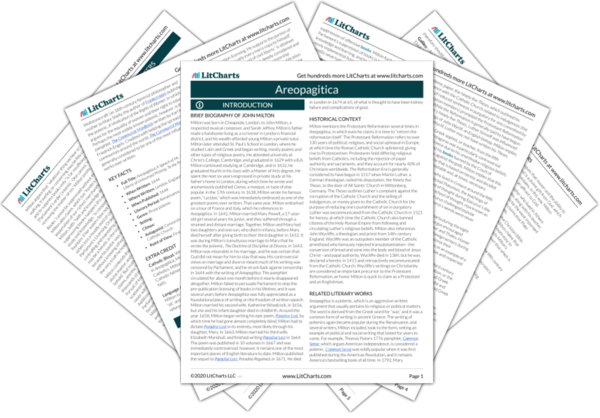Minor Characters
God
Milton repeatedly argues that reason and the ability to choose between good and evil is a divine gift from God, which Parliament’s Licensing Order violates. In this way, Milton implies that Parliament’s law is an affront to God.
Plato
An ancient Greek philosopher who lived in Athens around the fifth century B.C.E. Plato, along with his teacher, Socrates, are generally considered to be the most important figures in Western philosophy. Milton claims that Plato encouraged the reading of Aristophanes,
Christ
Jesus Christ, the son of God in the Christian Bible. Even though Christ “preached in public,” Milton claims that “writing is more public than preaching; and more easy to refutation, if need be.” This comparison reflects Milton’s opinion of the importance of written speech over that which is spoken.
Socrates
An ancient Greek philosopher from the fifth century B.C.E. Socrates was Plato’s teacher. Plato accused Aristophanes’s play, The Clouds, of contributing to Socrates’s trial and subsequent execution.
King Charles I
King of England from 1625 to 1649. King Charles was responsible for initiating the Star Chamber Decree in 1637.
Aristophanes
A Greek playwright from the fourth century B.C.E. Plato claimed that Aristophanes’s play, The Clouds, contributed to the trial and execution of Plato’s teacher Socrates. Despite this, Milton claims that Plato still praised Aristophanes’s work and did not support banning or censoring his books.
Dionysius
The Greek God of the theater. Plato “commends” the reading of Aristophanes’s plays to Dionysius.
Homer
A writer from the Greek region of Ionia, near the ancient city of Troy, famously known for epic poems like
The Iliad. According to
Milton,
Lycurgus encouraged the reading of
books by Homer to “prepare and mollify the Spartan surliness.”
Thales
A writer from the Greek region of Ionia, near the ancient city of Troy. According to Milton, Lycurgus encouraged the reading of books by Thales to “prepare and mollify the Spartan surliness.”
Carneades
A Greek philosopher from the third century B.C.E. Cato the Censor of Rome despised Greek writing like those by Carneades and sough to “banish all such Attic babblers out of Italy.”
Critolaus
A Greek philosopher from the second century B.C.E. Cato the Censor of Rome despised Greek writings like those by Critolaus and sought to “banish all such Attic babblers out of Italy.”
Scipio
Scipio Africanus, a Roman general and senator from the third century B.C.E. Milton refers to Scipio as a “noble” senator because he “withstood” Cato the Censor who wanted to ban all Greek books in Rome. Because of Scipio, Milton implies, Greek books were not censored or banned in Rome.
Naevius
Gnaeus Naevius, a Roman poet who was punished for libel in ancient Rome and made to recant. Milton offers Naevius as an example of an acceptable reason to censor or ban books.
Menander
A Greek dramatist from the fourth century B.C.E. According to Milton, Roman poet, Gnaeus Naevius was influenced by Menander.
Augustus
Emperor of the Roman Empire from 27 B.C.E. to 14 C.E. Milton claims that ancient Rome only banned books found to be heretical or libelous. In only these instances, Milton claims, books “were burnt,” and their authors “punished by Augustus.”
Padre Paolo
Paolo Sarpi, an Italian bishop and historian whose book, The History of the Council of Trent, exposed the power and corruption of the Council of Trent and was subsequently banned. Milton implies that Paolo Sarpi’s book was the first to be suppressed by the Catholic Church.
Martin V
Pope of the Roman Catholic Church from 1417 to 1431. Martin V’s papacy began shortly after Jan Huss was executed by the church during the tumultuous years leading up to the Protestant Reformation.
Dionysius Alexandrinus
Pope Dionysius of Alexandria. Milton mentions Pope Dionysius as an especially pious man who sought to safeguard himself from evil by reading heretical books. Pope Dionysius illustrates Milton’s overarching argument that reading “bad books” does not make one bad by extension.
Paul
An apostle who preached the gospel in the first century C.E. Milton quotes Paul’s letter to the Thessalonians (1 Thessalonians 5:21).
Solomon
The King of Israel during biblical times. Milton claims that Solomon said that much reading “is a weariness to the flesh,” but he did not say, according to Milton, that it is “unlawful.”
Zwinglius
Ulrich Zwingli, the leader of the Protestant Reformation in Switzerland. Milton implies that to abandon the reformation and consider Protestants fully reformed is a disservice to Protestantism’s founding fathers, like Calvin and Zwingli.
Sir Francis Bacon
An English philosopher who lived from 1561-1626. He is known for valuable work in the field of inductive reasoning, and he is credited with being one of the inventors of the scientific method. Milton quotes Sir Francis Bacon in Areopagitica.
Lucifer
The Devil in the Christian Bible. Milton hopes that Parliament’s Licensing Order of 1643 falls “from the stars with Lucifer,” like the Star Chamber Decree did. In this way, Milton implies that Parliament’s Licensing Order is not only unchristian but evil.
Euripides
A Greek tragedian who lived in Athens during the fifth century B.C.E. Milton quotes Euripides’s play, The Suppliants, at the beginning of Areopagitica.
